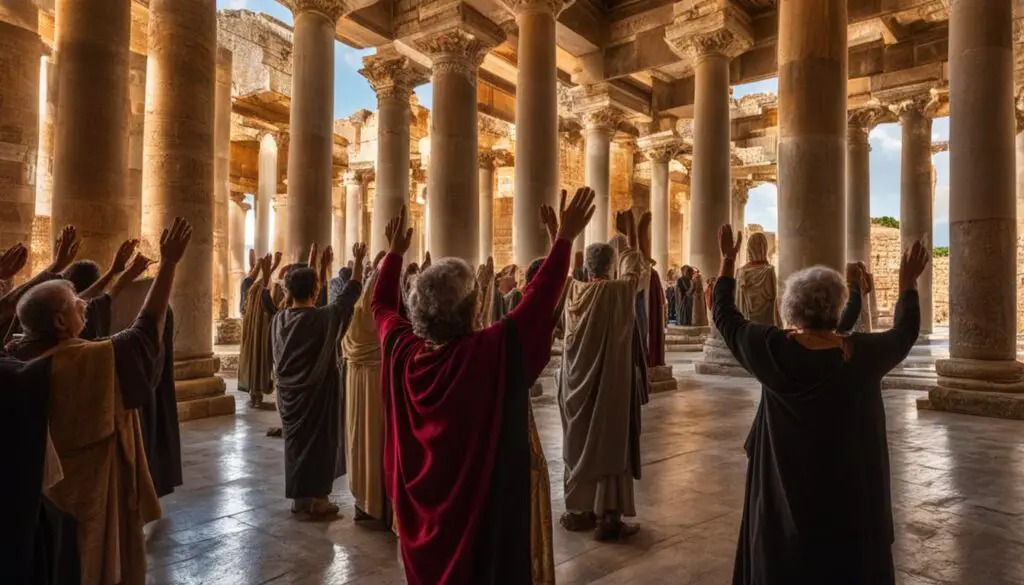Ephesus, an ancient city in Asia Minor (modern-day Turkey), holds a deep-rooted Christian history that continues to captivate visitors from around the world. The church in Ephesus, with its mysterious origins and founders, stands as a testament to the early days of Christianity and its enduring significance.
Key Takeaways:
- Discover the rich history and significance of the ancient Ephesus church.
- Uncover the key beliefs and doctrines that shaped the church in Ephesus.
- Explore the archaeological remains of the Ephesus church ruins.
- Learn about the denominational splits and schisms that affected the church in Ephesus.
- Understand the leadership and governance structure of the church in Ephesus.
Key Beliefs and Doctrines of the Church in Ephesus
The church in Ephesus adopted the key beliefs and doctrines of early Christianity as taught by the apostle Paul. These teachings formed the foundation of their faith and guided their understanding of God, salvation, and Christian living. Some of the key beliefs and doctrines of the church in Ephesus include:
- Salvation through Faith in Jesus Christ: The church emphasized the belief that salvation is possible through faith in Jesus Christ. They believed that Jesus, as the Son of God, died on the cross to pay for the sins of humanity, and through faith in Him, individuals could be reconciled with God and receive eternal life.
- Unity of Believers in the Body of Christ: The church in Ephesus embraced the idea that all believers are united as one body in Christ. They saw themselves as part of a larger community of believers, interconnected and supporting one another in their faith journey.
- Moral Teachings of Christian Living: The church valued ethical conduct and emphasized the importance of living a life that reflects the teachings of Jesus Christ. They believed in practicing love, compassion, and integrity in their relationships and in society.
The teachings of the apostle Paul, who played a significant role in establishing the church in Ephesus, greatly influenced the beliefs and doctrines of the church. His letters to the Ephesian believers, such as the Epistle to the Ephesians, provided guidance and instruction on various theological and practical matters.
“For by grace you have been saved through faith. And this is not your own doing; it is the gift of God, not a result of works, so that no one may boast.” – Ephesians 2:8-9
The church in Ephesus held these beliefs and doctrines dear and sought to live them out in their daily lives. They believed that their faith in Jesus Christ had the power to transform lives and impact their community.
| Beliefs and Doctrines | Key Elements |
|---|---|
| Salvation through Faith in Jesus Christ | Belief in Jesus as the Son of God, His sacrificial death, and the need for personal faith in Him for salvation. |
| Unity of Believers in the Body of Christ | Recognition of all believers as part of a larger community, connected and supporting one another in their faith journey. |
| Moral Teachings of Christian Living | Emphasis on practicing love, compassion, and integrity in relationships and society. |
Historical Significance of the Church in Ephesus
The church in Ephesus holds immense historical significance as one of the prominent centers of early Christianity. Its establishment and presence in Ephesus contributed to the spread and growth of the Christian faith throughout Asia Minor. The church played a vital role in shaping the religious and cultural landscape of Ephesus during its time. Today, the remains of the ancient city of Ephesus, including the church, serve as a testament to its historical significance and attract visitors from around the world.
Located in modern-day Turkey, the Ephesus archaeological site offers a glimpse into the early Christian heritage of the city. The site features well-preserved ruins and structures that provide valuable insights into the daily life and practices of the church in Ephesus. Visitors can explore the grandeur of the ancient city and experience firsthand the historical context in which the church thrived.
The church in Ephesus became a focal point of early Christian history due to its association with notable figures such as the apostle Paul and the apostle John. Paul, who played a crucial role in spreading the Christian message, established a strong presence in Ephesus during his missionary journeys. The church in Ephesus served as a hub for evangelism and discipleship, attracting believers from diverse backgrounds and fostering a vibrant Christian community.
Historical Significance Table
| Aspect | Significance |
|---|---|
| Spread of Christianity | The establishment and presence of the church in Ephesus contributed to the spread and growth of Christianity throughout Asia Minor. |
| Cultural Impact | The church played a vital role in shaping the religious and cultural landscape of Ephesus, leaving a lasting impact on the city. |
| Historical Testimony | The remains of the ancient city and the church serve as a testament to the historical significance of Ephesus and attract visitors from around the world. |
The historical significance of the church in Ephesus extends beyond its role in early Christianity. It also serves as a window into the broader historical and cultural context of the ancient city of Ephesus. The ruins and artifacts found at the archaeological site provide valuable insights into the daily life, practices, and beliefs of the people who lived during that time. As visitors explore the site, they can gain a deeper understanding of the historical complexities and the interplay between religion, society, and culture.
The church in Ephesus remains a symbol of the enduring legacy of early Christianity, attracting researchers, scholars, and tourists who seek to delve into the rich history and experience the spiritual significance of this ancient site. Through its archaeological remains and historical importance, the church in Ephesus continues to inspire and captivate individuals from all walks of life, allowing them to connect with the roots of their faith and appreciate the profound impact of Christianity in shaping the world.
Denominational Split or Schisms in the Church in Ephesus
The early church in Ephesus experienced several denominational splits and schisms throughout its history, reflecting the broader context of early Christianity. These divisions were often caused by theological disagreements and differences in the interpretation of Christian doctrine. The resulting factions within the church in Ephesus had varying beliefs and practices, leading to a loss of unity and potential conflicts among its members.
One notable schism in the church in Ephesus took place during the second century, known as the Montanist controversy. The Montanists, led by Montanus, believed in the continuation of prophecy and claimed to have received new revelations from the Holy Spirit. Their teachings and practices differed from the established church’s beliefs and were met with opposition and criticism. This controversy led to a significant split within the church in Ephesus, with some individuals aligning themselves with the Montanists and others remaining faithful to the traditional teachings.
“The Montanist controversy in Ephesus revealed the deep theological divisions within the church. The conflict centered around the question of ongoing revelation and the authority of the prophetic gifts.”
Another significant schism in the church in Ephesus occurred during the fourth century, known as the Arian controversy. The Arians, led by Arius, denied the full divinity of Jesus Christ and taught that he was a created being. This theological disagreement led to intense debates and conflicts within the church, resulting in the excommunication of Arius and his followers. The Arian controversy had far-reaching implications for the church in Ephesus and had a lasting impact on Christian doctrine and theology.
These denominational splits and schisms in the church in Ephesus reflect the challenges faced by early Christian communities in maintaining unity and doctrinal purity. While they caused divisions and conflicts at the time, they also led to theological clarifications and the development of Christian doctrine as different perspectives were examined and debated.
| Schism | Founder/Leader | Main Disagreement |
|---|---|---|
| Montanist Controversy | Montanus | Belief in the continuation of prophecy and new revelations from the Holy Spirit |
| Arian Controversy | Arius | Denial of the full divinity of Jesus Christ |
Table: Denominational Splits and Schisms in the Church in Ephesus
Leadership and Governance of the Church in Ephesus
The church in Ephesus was characterized by a well-defined system of leadership and governance, which was instrumental in guiding and nurturing the community of believers. Drawing upon the apostolic authority and teachings of leaders like Paul, the church appointed overseers, also known as bishops or elders, to provide spiritual guidance and oversight. These overseers played a crucial role in shepherding the members of the church, ensuring the adherence to sound doctrine, and fostering unity among the believers.
In addition to overseers, the church in Ephesus also had a significant role for deacons. Deacons were responsible for various practical matters, such as meeting the needs of the community, supporting the ministry of the overseers, and assisting in the organization of worship services and other church activities. Their service-oriented role was essential in promoting the well-being of the church and facilitating its mission in the local context of Ephesus.
Leadership Structure in the Church of Ephesus
The leadership structure in the church of Ephesus can be summarized as follows:
| Position | Role |
|---|---|
| Overseers (Bishops/Elders) | Provide spiritual guidance and oversight, teach sound doctrine, and promote unity among believers. |
| Deacons | Support the practical needs of the community, assist overseers in their ministry, and aid in organizing church activities. |
“The appointment of overseers and deacons in the church of Ephesus reflects the importance of both spiritual leadership and practical service in the life of the early Christian community.” – Early Christian Scholar
The leadership and governance structure of the church in Ephesus, shaped by the apostolic authority and teachings, provided a framework for the church to thrive and fulfill its mission in the ancient city. This system of leadership ensured the preservation of sound doctrine and the nurturing of a strong faith community, emphasizing both spiritual guidance and practical service.
Worship Practices of the Church in Ephesus
The church in Ephesus had a distinct set of worship practices that shaped its communal gatherings and reflected the early Christian traditions of the time. These practices centered around prayer, Scripture reading, hymn singing, and the celebration of the Eucharist. The church valued the participation of all its members in worship, emphasizing the importance of unity, reverence, and spiritual growth.
Communal prayers were an integral part of the worship experience in the church in Ephesus. Believers would gather together to lift their voices in prayer, seeking guidance, interceding for one another, and expressing their adoration and thanksgiving to God. These prayers fostered a sense of unity and community among the members, reminding them of their shared faith and common purpose.
The church in Ephesus valued the participation of all its members in worship, emphasizing the importance of unity, reverence, and spiritual growth.
In addition to prayers, the church in Ephesus placed a strong emphasis on the reading and teaching of Scripture. The early Christians would gather to hear passages from the Old Testament and the writings of the apostles, such as the letters of Paul and John. The reading of Scripture served as a means of instruction, encouragement, and spiritual nourishment for the community, guiding them in their faith and shaping their understanding of God’s Word.
Hymn singing was another vital component of worship in the church in Ephesus. Believers would join their voices together in songs of praise and worship, expressing their love for God and their devotion to Him. These hymns served as a way to proclaim their faith and reinforce their shared beliefs, while also providing an avenue for individual and collective spiritual expression.
The celebration of the Eucharist, also known as the Lord’s Supper or Communion, held a central place in the worship practices of the church in Ephesus. During this sacrament, believers would partake in the bread and wine, symbolizing the body and blood of Jesus Christ. The Eucharist served as a tangible reminder of Christ’s sacrifice and a means of spiritual nourishment, fostering a deep sense of unity and communion among the members.

Table: Comparison of Worship Practices in the Church in Ephesus
| Worship Practice | Description |
|---|---|
| Communal Prayers | Believers gathered to pray together, expressing their adoration, seeking guidance, and interceding for one another. |
| Scripture Reading | The church emphasized the reading and teaching of Scripture, drawing from the Old Testament and the writings of the apostles. |
| Hymn Singing | Believers joined together in songs of praise and worship, expressing their love for God and their devotion to Him. |
| Eucharist | The celebration of the Lord’s Supper, where believers partook in the bread and wine as a symbol of Christ’s sacrifice and spiritual nourishment. |
The worship practices of the church in Ephesus reflected their deep commitment to God and their desire to honor Him through their corporate gatherings. These practices not only enriched the spiritual lives of the believers but also helped strengthen their unity as a community. Today, the worship practices of the church in Ephesus continue to inspire and inform the worship traditions of Christian communities around the world, reminding believers of the rich heritage they share.
Contemporary Influence of the Church in Ephesus
The church in Ephesus continues to hold a significant influence in contemporary times, leaving a lasting legacy of early Christianity. As a Christian heritage site, the archaeological remains of the church and the ancient city of Ephesus attract a multitude of visitors from around the world. These visitors, composed of believers and tourists, are drawn to explore the historical and cultural significance of this ancient church.
Christian tourism, specifically to sites like the church in Ephesus, has gained popularity over the years. Pilgrims and tourists alike are captivated by the opportunity to walk in the footsteps of early Christians, connect with their faith heritage, and witness firsthand the remnants of a vibrant religious community. The church in Ephesus serves as a tangible link to the past, fostering a deeper understanding of the roots of Christianity and inspiring a sense of awe and reverence.
The contemporary influence of the church in Ephesus extends beyond the physical site itself. Its teachings and writings continue to shape and inspire Christians of different denominations and traditions. The Epistle to the Ephesians, attributed to the apostle Paul, offers timeless guidance on topics such as unity, love, and spiritual growth. These teachings are cherished by believers around the world, transcending time and geography.
Christian Heritage Sites and the Power of Pilgrimage
“Visiting the church in Ephesus was a profound experience. As I stood among the ancient ruins, I felt a deep connection to the early Christians who once worshipped here. It reminded me of the rich history and enduring legacy of our faith.” – Sarah, a visitor to Ephesus
Christian heritage sites like the church in Ephesus have the power to inspire faith, provide a historical context for believers, and offer a space for contemplation and spiritual reflection. They serve as reminders of the perseverance and transformative impact of early Christianity, keeping its influence alive in the present.
| Christian Heritage Site | Location | Visitor Numbers (Annual) |
|---|---|---|
| The Church in Ephesus | Ephesus, Turkey | 800,000+ |
| The Vatican | Vatican City | 5 million+ |
| Bethlehem | West Bank, Palestinian Territories | 2 million+ |
| Canterbury Cathedral | Kent, England | 1 million+ |
| Mount Sinai | Sinai Peninsula, Egypt | 300,000+ |
With over 800,000 annual visitors, the church in Ephesus holds its place among the most prominent Christian heritage sites in the world. Its allure and historical significance have made it a must-visit destination for those seeking a deeper understanding of the foundations of their faith.
In conclusion, the church in Ephesus continues to exert a significant influence, both as a physical site and through its teachings. Its historical and cultural legacy attract people from various backgrounds, inspiring them to explore and connect with the early Christian heritage. As believers and tourists embark on this journey of pilgrimage, they gain a greater appreciation for the enduring impact of the church in Ephesus and the message of Christianity it represents.
Current World Membership Number and Percentage of World Religions for the Church in Ephesus
As there is no direct information available about the current membership of the church in Ephesus, it is difficult to provide an accurate number. However, it is important to note that the church in Ephesus is part of the broader global Christian community, which comprises a significant percentage of the world’s population. Christianity, in its various denominations and traditions, remains one of the largest religions worldwide, with a diverse range of believers representing different cultures, languages, and theological perspectives.
To put the global membership of Christianity into perspective, let’s take a look at some statistics. According to the Pew Research Center’s study on global Christianity, there were an estimated 2.3 billion Christians in the world as of 2015. This accounts for approximately 31% of the global population, making Christianity the largest religion globally. It is worth noting that these numbers include various Christian denominations and traditions, each with its own distinct beliefs and practices.
While we cannot determine the specific percentage of world religions that the church in Ephesus represents, it is clear that Christianity as a whole maintains a substantial global presence. As believers continue to seek spiritual guidance and connect with their faith, the teachings and legacy of the church in Ephesus contribute to the vibrant tapestry of global Christianity, providing inspiration and guidance to millions around the world.
| World Religion | Estimated Membership | Percentage of World Population |
|---|---|---|
| Christianity | 2.3 billion | 31% |
| Islam | 1.8 billion | 24% |
| Hinduism | 1.1 billion | 15% |
| Buddhism | 500 million | 7% |
| Judaism | 14 million | 0.2% |
(Table: Estimated Membership and Percentage of World Population for Major Religions)
Conclusion
The church in Ephesus holds a significant place in the history of Christianity, symbolizing the rich traditions and teachings of early Christian communities. With its historical significance, worship practices, and contemporary influence, it continues to inspire and impact believers worldwide. The Christian heritage of the church in Ephesus serves as a testament to the enduring power of faith and the transformative potential of the Christian message.
Visitors to the archaeological site of Ephesus have the opportunity to witness this remarkable history firsthand and gain a deeper understanding of the early Christian heritage. The ruins of the church in Ephesus stand as a testament to its historical importance and attract countless visitors seeking to explore the roots of their faith. The worship practices of the church in Ephesus, such as communal prayers, hymn singing, and the celebration of the Eucharist, have influenced and shaped the broader worship traditions of early Christianity.
The contemporary influence of the church in Ephesus extends beyond its historical significance. The archaeological site, including the remains of the church, draws visitors from around the world who are eager to delve into the early Christian heritage of the city. Moreover, the teachings and writings associated with the church in Ephesus continue to inspire and guide Christians in their faith and spiritual journey today, serving as a lasting legacy of this ancient church.
The church in Ephesus, although its current membership is uncertain, remains an integral part of the global Christian community. Christianity, as one of the largest religions in the world, encompasses a diverse range of believers with various denominations, traditions, and theological perspectives. The church in Ephesus is a testament to the enduring impact of the Christian faith and the profound influence it has had on individuals and societies throughout history.
FAQ
Who established the church in Ephesus?
The origins and founders of the church in Ephesus remain unclear, but it is believed to have been established by the apostle Paul during his missionary journeys.
What were the key beliefs and doctrines of the church in Ephesus?
The church in Ephesus adopted the key beliefs and doctrines of early Christianity as taught by the apostle Paul. These included salvation through faith in Jesus Christ, unity of believers in the body of Christ, and the moral teachings of Christian living.
What is the historical significance of the church in Ephesus?
The church in Ephesus played a crucial role in the spread and growth of the Christian faith throughout Asia Minor. Its presence shaped the religious and cultural landscape of Ephesus during its time and serves as a testament to its historical significance today.
Did the church in Ephesus experience any divisions?
Yes, the church in Ephesus experienced divisions and schisms, reflecting the broader context of early Christianity. These splits were often caused by theological disagreements and differences in interpretation of Christian doctrine.
How was the church in Ephesus governed?
The church in Ephesus was governed by a system of leadership based on the principles outlined by the apostle Paul. This included the appointment of overseers (also known as bishops or elders) and deacons to guide and serve the community.
What were the worship practices of the church in Ephesus?
The church in Ephesus engaged in communal prayers, hymn singing, reading and teaching of Scripture, and the celebration of the Eucharist (also known as the Lord’s Supper). These practices reflected the broader worship traditions of early Christianity.
What is the contemporary influence of the church in Ephesus?
The church in Ephesus continues to inspire and impact believers worldwide through its historical and cultural legacy. The archaeological site of Ephesus attracts visitors interested in exploring the early Christian heritage, and the teachings associated with the church still guide Christians today.
How many members does the church in Ephesus currently have?
There is no direct information available about the current membership of the church in Ephesus. However, the church is part of the broader global Christian community, which comprises a significant percentage of the world’s population.
What is the significance of the church in Ephesus?
The church in Ephesus holds a unique place in the history of Christianity, embodying the rich traditions and teachings of early Christian communities. Its historical significance, worship practices, and contemporary influence continue to inspire and impact believers around the world.
















